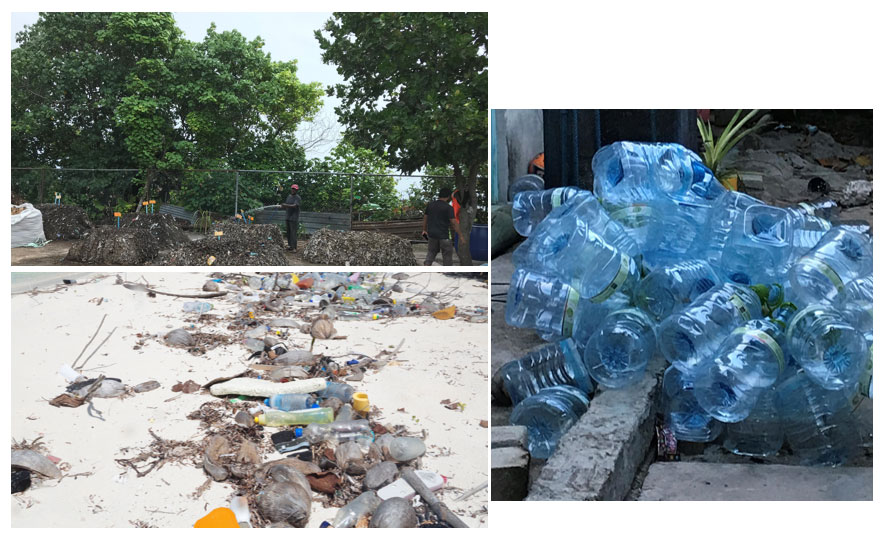by Sobah Abbas Petersen (SINTEF Digital) and Hanne Cecilie Geirbo (Oslo Metropolitan University)
In order to design digital technologies that solve problems in smart and sustainable ways, it is vital to consider the challenge from a bottom-up perspective. Studying waste management and circularity in confined areas, such as small islands, highlights the specific challenges presented by resource and space limitations and raises questions about the geographical scale of a circular economy or a smart and circular city.
Smart city technologies, such as sensors, are often used to monitor waste collection facilities and enable efficient management of resources. This often appears to be a top-down technical infrastructure–focussed approach, independent of the city or the geographical context. Studying waste management and circularity in small and confined spaces, such as the islands in The Maldives, highlights specific challenges presented by local resource and space limitations and raises questions about the geographical scale of a circular economy or a circular city [1]. Our studies identify the need for digital technologies that go beyond monitoring and optimisation of waste collection. Addressing the challenges from a bottom-up perspective is vital for the design of appropriate technologies for smart and sustainable solutions.
The Learning Flexibility project takes a bottom up approach and aims to identify innovative and sustainable solutions that arise locally through crises and vulnerabilities [L1]. The motivation for the project is to identify sustainable solutions from around the world that may benefit Norwegian and European cities. Thus, the project has conducted field studies in several cities, including Beirut, Lebanon and two islands in The Maldives, where the focus has been on waste management. A major finding from these studies is the necessity for circularity, particularly in confined areas with limited resources, such as the islands in The Maldives.
The impacts of waste management on the environment are well known and this is one of the key elements of environment vulnerability faced by small islands [2]. We conducted a case study in The Maldives to understand the challenges of waste management and potential innovative solutions to the problem. On one small inhabited island, the whole community is educated about waste sorting and recycling and almost 100% of household waste from the kitchen and foliage are composted; the compost is then used locally, but also has the potential to be sold outside the island. Activities to promote circular thinking are promoted, such as collecting rainwater and using compost for agriculture. Specific challenges include the local resources and capacity to process all the waste – e.g., a large volume of solid plastic waste remains, which needs to be transported for recycling (Figure 1). Similarly, the island is not able to consume all the compost produced locally, so some must be transported to other islands.

Figure 1: Solid plastic waste remains that need to be transported for recycling.
On another island, which is a tourist resort and spa, the community focuses on 5 Rs: refuse, reduce, reuse, repurpose and recycle. This has resulted in substantial waste reduction; most waste materials, from glass to oil, are recycled. Activities such as agriculture for local consumption are practised, where recycled grey water and locally produced compost are used. The resort manages to operate as a circular island city, where most of its waste is reused and recycled. However, plastic waste remains one of the main challenges, requiring transport off the island to be recycled into sports shoes and clothing [L2].
Clearly, circularity is a key aspect of managing waste, and in line with the ideas of the circular economy, recycling requires resources and reuse requires consumers. While circularity remains central to the waste management approaches practiced throughout many islands and cities, the lack of adequate local resources and physical space are challenges. The small geographical scale of the islands does not provide the resources for recycling or the consumers for the products.
We have identified three main areas where digital technologies could contribute to waste management and a circular economy approach. To refuse, reduce and reuse waste, digital technologies can play a central role in raising awareness and educating the community, enabling outreach to a larger number of people, particularly in isolated islands. It is evident from these field studies that the small geographical scale of the island cities precludes a complete circular economy; transportation is needed to obtain the desired circularity. Transportation, which relies mainly on diesel, is a major contributor to environmental pollution and poses risks to marine ecosystems. Optimising transportation is necessary to maximise the benefits of circular waste management, and this could be achieved by expanding the geographical scale of the circular island city. Thus, another important way that digital technologies could enable a circular approach is in the coordination and logistics of waste collection from the different islands and the transportation to recycling plants and landfill. Furthermore, digital technologies could provide a platform for connecting the different stakeholders and actors of the circular system, such as potential consumers or transportation agents.
Learning Flexibility is a multidisciplinary project, funded by the IdeLab program, Norwegian Research Council. Other field studies conducted by the project include waste management and urban micro forests in Beirut, Lebanon, politics, violence and public spaces in Medellin, Columbia, and urban decline and renewal in Detroit, USA. In addition to the authors, the project partners include The Peace Research Institute and the Oslo School of Architecture, Norway.
Links:
[L1] https://www.sintef.no/en/projects/2016/learning-flexibility-complexity-innovation-inter-u/
[L2] https://www.wired.com/2016/06/adidass-newest-shoe-made-recycled-ocean-plastic/
References:
[1] T.E Graedel, et al.: “On the Spatial Dimension of the Circular Economy”, Resources, 2019. 8(1): p. 32.
[2] A. Periathamby and S. Herat: “Sustainable waste management in Small Island Developing States (SIDS)”, Waste Management and Research, 2014. 32(8): p. 681 –682.
Please contact:
Sobah Abbas Petersen
SINTEF Digital, Norway











